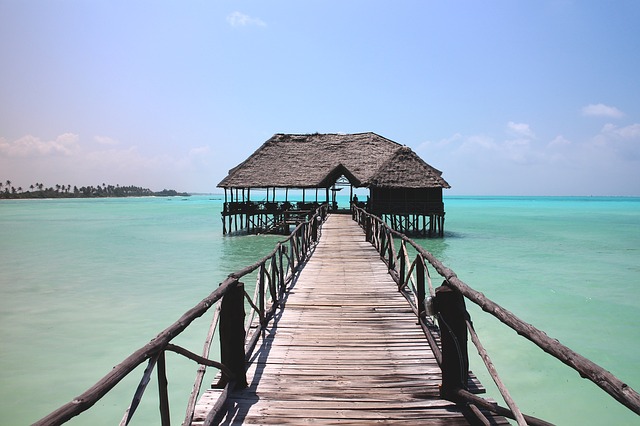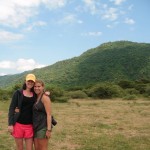Romance, Health, and Safety in Zanzibar

Romance, Health, and Safety in Zanzibar: A Conversation with Katrina Marks
Health in Zanzibar
Feminine Hygienic Products: What’s available/what’s legal/where to buy them?
Though Stone Town, Zanzibar thrives on tourism, and therefore many of the local businesses have adapted to cater to the norms of American and European tourists, feminine hygiene has not been a main focus. Outside of a hotel (or even inside of one), you will be hard-pressed to find a tampon (with or without an applicator).
Maxi pads and panty liners are abundant and available in most of the supermarkets you’ll find tucked away within Stone Town’s alleyways. If you’re taking a trip to a more rural area, you’ll want to stock up in town beforehand.
If (like me) the thought of wearing a pad to the beach on a balmy 90-degree day with 100% humidity doesn’t appeal to you, you might consider making some of your own preparations. Additionally, if traveling for a brief period, you can always buy your tampons at home and bring them along. To date, no feminine hygiene products are illegal in Zanzibar. Menstrual cups, such as Diva Cup or Lunette, are ideal for travel.
Most bathrooms in Stone Town have a private water source available that you can use to rinse the cup, making them even more convenient to use in Zanzibar than in the US. Make sure you purchase one in advance of your trip, as they are not sold in stores in Zanzibar.
They’re small to pack, cost-effective over the long-term, environmentally friendly, don’t have to be changed for at least 12 hours (about the length of a flight from the US to Zanzibar), and, as opposed to tampons, carry an extremely low risk for Toxic Shock Syndrome. Most bathrooms in Stone Town have a private water source available that you can use to rinse the cup, making them even more convenient to use in Zanzibar than in the US.
Make sure you purchase one in advance of your trip, as they are not sold in stores in Zanzibar.
Cups do have a bit of a learning curve, however. As an alternative or complement to menstrual cups, I would recommend reusable pads or period panties, such as Thinx. Thinx are underwear designed to function like a panty liner without feeling like one, with the same economic and environmental benefits cups provide. You can rinse the panties in your hotel room, dry them in the sun, and reuse throughout your trip.
Birth Control: What’s available/what’s legal/where to buy them?
Finding the right birth control method for your body and goals is a difficult task in itself, even without adding international travel and healthcare regulations to the mix. If starting birth control for the first time, it is certainly something to consider well, well in advance of your trip (I’d allow at least 6 months in case you need to try various methods).
For local women in Zanzibar, the most popular methods are combination birth control pills and Depo-Provera shots, both available at local clinics and hospitals. Both have their benefits and risks, however. Birth control shots are convenient, only needed every 3 months, and carry less risk of user error than the pills. If you use this method at home and plan to get your next shot in Zanzibar, however, you should be sure to go to a well-regarded clinic and work with an experienced physician.
There have been reports of non-standard sterilization practices in Tanzanian clinics, especially in rural areas, which you should be aware of before going anywhere near a needle in an HIV-prevalent country.
Combined oral contraceptive pills are by far the most widely used birth control method. They are prescribed in monthly packs and you take them at the same time daily, usually including one week of sugar pills during which you have your regular period.
Combined oral contraceptive pills are by far the most widely used birth control method. They are prescribed in monthly packs and you take them at the same time daily, usually including one week of sugar pills during which you have your regular period. You can get them at local clinics, though you may want to confirm that your specific brand of pill is available before setting your plans.
In some cases, you may even be able to get pills for months in advance at home and pack them for your trip (though insurance may not cover the cost).
Because of Zanzibar’s climate, you should pay special attention to the storage regulations of contraceptive pills. Most brands should be stored at temperatures between 68 and 77 degrees Fahrenheit, with the effectiveness reduced by up to 75% if improperly stored. Temperatures in November and December rise into the high-90s, with constant humidity. You’ll want to be sure to store the pills in air conditioning (if available) or in a cool, dark place on the floor, and never leave them in a car or in your beach bag sitting in the sun.
For the most effective, convenient and long-term birth control, I would recommend an Intrauterine Device (IUD). This is a small T-shaped device inserted into the uterus, which lasts for 3-5 years (hormonal) or 9-10 years (non-hormonal). Hormonal IUDs have even been known to stop periods for some women.
Arm implants such as Nexplanon provide some of the same benefits and last for up to 3 years, but have slightly more sporadic side effects.
Arm implants such as Nexplanon provide some of the same benefits and last for up to 3 years, but have slightly more sporadic side effects. For travel, these methods require no upkeep, nothing to pack, nothing to worry about. If you would like more flexible birth control or you have a medical condition preventing you from getting the implant, however, you’ll need to try out some other options.
Gynecologists: Are there any that you recommend? How, if at all, is a visit different from at home?
While I cannot profess personal experience related to gynecologists in Zanzibar, I can offer the following information on the medical care available. In most cases, you’ll want to handle any routine or expected doctors visits before travelling. Of course, for emergencies or problems that present themselves during your trip, there are a number of public and private hospitals and clinics in and near Stone Town.
The private clinics, such as Al Rahma Hospital (+255-24-2236715), offer slightly better care than the public hospitals, such as Stone Town Medical Clinic (+255-777-777112).
When asking for a gynecologist, do not be surprised to find only male doctors on the staff list.
You should be aware that the medical standards in these clinics are below US recommendations. However, that does not mean that you should avoid them. The doctors will be able to help you more than the bottle of Advil in your hotel room will, and they will be able to make recommendations for further treatment if your issue is serious.
When asking for a gynecologist, do not be surprised to find only male doctors on the staff list. While women dominate the specialty in the US, men in Tanzania dominate most professions, including medicine. You should also expect a longer wait than you might be used to in the US, especially if you visit a public hospital. Again, it may be advisable to ask about the clinic’s sterilization methods if you need an injection or other procedure involving hospital instruments.
Breastfeeding: What are accepted places for women to breastfeed? Is it accepted to do so in public?
As a 99% Muslim community, Zanzibar has an extremely patriarchal culture, with a very rigid expectation of female modesty, even in motherhood. Breastfeeding is not acceptable in public, and is best done inside the home (or hotel room).
If you do decide to breastfeed in a semi-public area (a secluded area of beach, empty hostel common room, etc.), any passersby probably won’t harass you. But they will take notice, and they will find it strange, perhaps offensive.
Romance in Zanzibar
Dating Locals: What are the norms and traditions? What should women look out for?
As someone who is dating a local, I have many good things to say about it! Zanzibar’s culture is generally very open and friendly, and the high tourist flow means that locals are used to interacting with people from many different countries. There are a number of expats from Europe, America and Australia (mzungus, Swahili for “white person”) who are dating or married to local Zanzibaris. However, for unknown reasons, it is far more common to see a mzungu woman with a local man than it is to see a mzungu man with a local woman. The situation tends to be reversed in most other East African countries.
Most of these expats have committed relationships with locals and have decided to raise their families in Zanzibar. However, there is a prevalent sense that most mzungu women in Zanzibar are seeking out casual sex. Whether this is a trend that follows the general evolving attitude towards sex in Western countries or an explanation imposed on the women by the local patriarchal standard is unknown.
Women travelers in Zanzibar
Regardless, men who hold this impression tend to be very forward with their advances. It is extremely common for men to call out “I love you” as you walk down the street, to approach you in public places, to make comments about your body either to you or to other men, to touch your hair (especially blondes) or kiss your hand. Obviously, this is uncomfortable.
While you may feel the urge to rebuke them directly, this can lead to even more issues. Rather, ignoring these behaviors will cause the men to become bored very quickly. You can refuse to give out your number or your name and do not need an excuse, though they will likely ask for one. It is rare for these kinds of interactions to escalate to sexual assault, but it is a realistic possibility, just as it is in the U.S. and most other places.
Unfortunately, women all over the world are well versed in these kinds of interactions, and have developed their own defenses against them. You should be prepared to pull yours out on a frequent basis while in Zanzibar.
Even if you’re not looking for romance, it is easy to make friends in Zanzibar if you’re open to hearing their perspectives.
Though the patriarchy in Zanzibar is aggressive, you should not let it stop you from engaging with locals. People will not be shy to start a conversation with you, if only to practice their English skills. They enjoy discussing international politics, language, music, your life story, etc.
Not all of these will have a sexual end game. In fact, most won’t. Speaking for myself, my relationship developed out of these types of conversations, over a long period of time, without any overt sexual advances. Even if you’re not looking for romance, it is easy to make friends in Zanzibar if you’re open to hearing their perspectives.
Men
Though generalizations leave much to be desired in any context, it is possible to categorize several types of men in Zanzibar in terms of how they behave toward women. There are those that have been discussed, who seek out casual sex and imagine that sexual harassment is the way to get it. These men are usually best avoided. But the men in Zanzibar are much more complicated than “good” and “bad,” “harmless” and “dangerous” denotations can explain.
In addition to those whose first words will be “hello beautiful,” there are those who will start the conversation with a marriage proposal. Whether they’re serious or not depends on the context and (probably) your answer. Local men and women tend to marry young, in their late teens to early twenties. In many families, especially those of Arab or Indian descent, marriages are still arranged and usually depend in part on the economic implications of the union.
Polygamy is common in Zanzibar, as Muslim men can have up to four wives. If you are coming from a relatively developed country, it is not uncommon for some men to ask you to bring them home with you (i.e. get them a visa through marriage).
It is not easy to tell one type of man from another just by looking (sometimes, they fall between the categories), but fear of the bad sort should not cause you to close yourself off.
These tend to be awkward conversations. The simplest way to reject a marriage proposal of this sort is to assume it’s a joke. It very well may be. And if it isn’t, your hopeful husband probably won’t contradict you if you laugh and respond with a light refusal.
Not all the men in Zanzibar are out to either wed you or bed you. These are simply behaviors the patriarchal nature of the society has allowed to become commonplace. There are plenty of genuinely friendly, helpful, understanding men in Zanzibar who know that women should be respected, not objectified. These are the men who will give you directions when you’re lost, then just escort you to your destination when they see how confused you are.
They are the type you pass every morning at the fruit stand, who, once they come to know you, offer you gifts of oranges and apples. They will teach you Swahili, and expect you to practice. It is not easy to tell one type of man from another just by looking (sometimes, they fall between the categories), but fear of the bad sort should not cause you to close yourself off.
LGBTQ-friendly?
In a word, no. Officially, homosexuality is illegal in Zanzibar, punishable by prison time (up to five years for same-sex acts between women, and a life sentence for men). Tanzania has one of the harshest anti-homosexuality policies in the world, and at the community level opinions tend to be complicated, hypocritical, and religiously or culturally cemented.
All of this does not necessarily affect visitors in the same way it affects the local community, however. As a foreign tourist, you will not be arrested for homosexuality in Zanzibar, though some unsavory locals may attempt to blackmail you with the prospect. Generally speaking, whether you’re in a homosexual or a heterosexual relationship, you should refrain from public displays of affection.
Even holding hands will draw some negative attention from the locals (though for men, holding hands is sometimes simply a sign of friendship).
Even holding hands will draw some negative attention from the locals (though for men, holding hands is sometimes simply a sign of friendship). Otherwise, if you behave discreetly in an effort to respect cultural norms, no one should have any reason to harass you. When you check in to your hotel, don’t be surprised if you are given twin beds, depending upon the views of the establishment or the person working at the desk.
If you do not identify as heterosexual or cisgendered, you may expect to see or hear some disturbing views about your identity, and of course hiding it out of fear is a deeply problematic necessity, but this in itself does not mean you should stay away from Zanzibar. While some locals will disapprove, others will be just as welcoming and accepting of you as they are of other tourists.
Women’s Place in Zanzibari Society
Women’s Rights: Do women have the same position in society as men? How can you tell?
As mentioned before, Zanzibar has a very stringent patriarchy. While increased access to education and changing understandings have resulted in some improved equality for women, especially in the professional sphere, most women are still considered homemakers.
Even schoolgirls, those who harbor aspirations of becoming doctors or lawyers, often find their studies stymied by domestic demands. While their brothers have hours of free time to do their homework, girls are expected to begin cooking and cleaning once they get home from school.
There are a number of markers that point to this level of inequality in Zanzibar. The sexual harassment discussed earlier is one. This is just as (if not more) common for local women (including girls in school) as it is for foreign visitors.
Additionally, local women in Zanzibar are taught that femininity is equivalent to modesty and demure behavior.
Additionally, local women in Zanzibar are taught that femininity is equivalent to modesty and demure behavior. While you’ll be greeted by men with a loud and enthusiastic “Jambo!” as you pass them on the street, most women will avert their gaze and look downward, perhaps with a small smile or quiet “Hello” if you greet them first.
Women will not approach you, and even if you seek them out, they’ll be very reluctant to talk with you. Part of this is to do with the skew of English education between men and women. Though girls in school tend to be more dedicated to their studies, they are also less likely to speak up in class or practice their language skills with foreigners.
Local Women: What are some clear cultural differences between you and them?
The main responsibilities of local women lie in cooking, cleaning and raising children. While this is not an entirely foreign concept to women in Western countries, the traditional roles are shifting quickly.
In Zanzibar, while they may wobble slightly, those roles are still very much set in stone, especially in more rural areas. For more information from an organization attempting to challenge these norms, check out the Forum for African Women Educationalists in Zanzibar, a female empowerment NGO working in Zanzibar’s school system.
Romance, Health, and Safety in Zanzibar
It is important to note that most Muslim women in Zanzibar wear hijab, a headscarf, or nikaab, coverings for the head and face. For some, their husbands suggest this dress. But for the majority, the choice to cover the head and body is a deeply spiritual one, not a sign of subjugation. In fact, some have argued that head coverings free women from the male gaze, thereby empowering them.
The use of head coverings in Islam is a complicated subject, largely dependent upon the specific culture at hand. Though this may or may not be different from your own practices or what you are used to seeing at home, you should understand it as a deeply complex topic that requires cultural consciousness.
Women-Specific Environments: Are there places where only women are or are not allowed?
While some businesses may have a women’s prayer room, generally speaking there are few places where only women are allowed. If you visit the home of a local for an extended period of time, he or she may encourage you to sit with the women in the kitchen or to help cook. You are not necessarily banned from other spaces in the house (other than the usual private ones), but you will notice loose physical boundaries between gender roles.
Women (and non-Muslims, additionally) are not allowed inside the mosques in Stone Town. At the call to prayer, most men leave their homes or offices to pray while women either carry on their work or pray in a separate room.
Perception of Foreign Women: How do local men/women react to you when you say where you’re from?
Zanzibar receives thousands of visitors every year from every corner of the world. That means that most locals (especially those who frequent Stone Town) are accustomed to seeing women who look, speak, dress and act differently from them. Most likely, they will ask you questions about how you compare Zanzibar to your home country, how life is in your country generally (a harder question than you would think), and what parts of Zanzibar you have enjoyed most.
If they’re used to dealing with tourists and have the knowledge, they’ll probably give you recommendations on what to do, see or eat next.
There are exceptions. Tourists don’t usually venture out to more rural areas, or even the villages that surround Stone Town proper, so you can expect to be met with more attention in these places. Children particularly will sing a chorus of “mzungu, mzungu!” as you walk through the village, and their parents may view you with curiosity (or, for a few, apprehension).
The dominance of Islam in Zanzibar has its influence on the perception of foreigners as well.
The dominance of Islam in Zanzibar has its influence on the perception of foreigners as well. If you are a woman who does not wear a head covering, locals will probably assume you are Christian. They will not be shy to ask, or to discuss differences in religion with you at length.
Usually, they will be happy to inform you about the beliefs and traditions of Islam, or to teach you some rudimentary Arabic. You should not respond with your own evangelism, whether religious or secular. Whatever the nature and degree of your beliefs, you should understand that Islam cuts through the way of life in Zanzibar. Challenging it openly will offend people.
If you are uncomfortable discussing religion, you can easily change the subject or remove yourself from the conversation. Most Muslims in Zanzibar, as elsewhere, are not radical or violent. Radical or anti-Western lines of thought do exist in Zanzibar (just as they exist in other parts of the world, including America and Europe), and have affected a few tourists in the past, but most foreigners (including myself) never confront serious issues related to religious violence.
Safety in Zanzibar
Transportation: Any that are safer/less safe for women to take?
Stone Town proper, where most of the hotels, restaurants and tourist spots are located, is one of the most walkable cities in the world. In fact, there is only one road open to cars that runs in a circle around the town.
To get to most places, you’ll wander by foot through the many narrow alleyways. At home, “dark alley” is a synonym for “don’t go there”, but in Stone Town, these alleys are usually busy and scattered with shops where you can get directions when (not if) you get lost. Exercise a normal degree of caution, but walking is generally the most convenient and safest method of transportation.
Should you venture further afield, you will need to find a vehicle. The most common local transportation is called the daladala, local vans that have been turned into buses. Despite the name, it actually costs less than a dollar.
The price is 300 shillings (about 25 cents) to ride, and they run from Stone Town to other nearby neighborhoods as well as other towns on the island, such as the resort town Nungwi in the north. While cheap and convenient, the daladala has its drawbacks. In regards to safety, the vans are not well-maintained and are known to break down on the side of the road fairly often (in which case the driver will flag down another daladala to finish your journey).
Traffic in Zanzibar treats lanes, lights and signs as mere suggestions, and accidents involving daladalas do happen, if not as frequently as those with scooters or small vehicles.
Traffic in Zanzibar treats lanes, lights and signs as mere suggestions, and accidents involving daladalas do happen, if not as frequently as those with scooters or small vehicles. In regard to comfort from a female perspective, sexual harassment is as common on the daladala as it is in most other public places. You’ll also need some practice with a local guide or a helpful driver to navigate the daladala, as the stops are not marked.
Taxis are the second-most common method of transportation, and can be picked up from most tourist spots in Stone Town. Though more expensive than the daladala (price varies according to your destination and negotiation skills), taxis are more comfortable and offer more isolation. But while most drivers will get you and your belongings to your location safely, there are exceptions. In Zanzibar, there have been cases of taxi drivers operating with thieves to arrange muggings.
In mainland Tanzania, people have referenced “temporary kidnappings” in which drivers refuse to let passengers go until they hand over their belongings. These are not common, and you should not assume it will happen to you if you take a taxi. Do make sure to settle your price with the driver before hiring him to avoid any surprises later on. And if you can get a specific recommendation for a trusted driver from your hotel or a friend, this will be your safest option for transportation.
Dangerous area/s: Any specifically for women?
Stone Town proper is quite compact, therefore any darker-than-usual alley probably leads to a better lit and more crowded one within 100 meters or so. However, there are certain places within the typical tourist’s sightseeing grounds that you’ll want to avoid. Zanzibar is famed for its beaches, but you won’t find them in Stone Town. The much-photographed expanses of powdery, white sand lie on the east or north coasts of Zanzibar, about an hour’s drive from town.
There are several beaches in Stone Town close to the major hotels (Hyatt, Serena and Tembo Hotels all sit directly on the beach), and you can feel free to walk or wade (I wouldn’t recommend swimming) in the daylight with a trusted group of friends or fellow travelers, preferably with a male included. However, lone tourists (both men and women) have become targets for muggings on the beach.
Additionally, most drug deals (there are many in Zanzibar) take place at the beach once darkness hits.
A lone woman is more likely to be harassed (or assaulted), and the streets are less populated at night, lowering your options for help if you are lost or need protection.
Should you find yourself in danger (or afraid of being in danger) at any time, you should get to a populated area as soon as possible, then to a hotel or police station (there is one located in Fordhani Harbor, close to the beach, and one in the neighborhood of Mkunazini near the Anglican Cathedral).
Should you venture outside of Stone Town proper to the residential villages that surround the city, you should take a friend or a guide if possible, and go in daylight. The daladala does not have marked stops, so it takes some local knowledge to navigate, made even more difficult in the dark. A lone woman is more likely to be harassed (or assaulted), and the streets are less populated at night, lowering your options for help if you are lost or need protection.
Clothing: What to wear/what not to wear?
As Zanzibar is a majority Muslim community, women should take care to dress modestly. While you will see other tourists and even some local women in short skirts, tight jeans or tank tops (especially in the bars at night), you should be aware that many locals view this kind of dress as disrespectful to their cultural values. Long skirts (below the knee), loose pants and shirts that cover at least the shoulders are preferred.
You’ll find many of these items for sale in the tourist shops throughout Stone Town, but you should make some of your own preparations as well. Bikinis and shorts are acceptable on the beach, but you should pack a long dress or a cover-up for your return to town.
During Ramadan, you should be conscious of where you sunbathe. Some beaches are located close to areas locals frequent. Wearing a more modest swimsuit or finding a secluded strip of beach (which isn’t difficult in Zanzibar) will help you to avert any offense.
Women are not required to wear headscarves in Zanzibar. However, as complicated as the subject is for Muslim women, it is also complicated for foreign non-Muslim women.
Women are not required to wear headscarves in Zanzibar. However, as complicated as the subject is for Muslim women, it is also complicated for foreign non-Muslim women. Most tourists do not wear headscarves, or if they do, they wear one loosely draped over the head and remove it in hotels or tourist-dominated restaurants. Generally, locals do not expect non-Muslims to wear hijab, as it is a spiritual choice.
That said, depending on how long your stay is and whether you come during the holy month of Ramadan, some locals may hint that doing so shows respect. Ultimately, to wear a scarf or not is a personal choice, and requires your own reflection on your faith and willingness to adhere to cultural values.
What you should be sure to avoid is an obviously flippant attitude toward the headscarf. Hijab is about faith, not fashion. If you wear it, you should not remove it in public. You should also be prepared to deal with the religiously focused conversations it may spur, and have answers ready for those who ask why you do or do not wear it.
Romance, Health, and Safety in Zanzibar Related Reading
Zanzibar Tourism: Describing My Home to the People of Zanzibar
Volun-touring Versus Volunteering in Zanzibar
I Buried My Heart in Zanzibar
Have you traveled to Zanzibar? What were your impressions? Email us at editor@pinkpangea.com for information about sharing your experience and advice with the Pink Pangea community. We can’t wait to hear from you.
Romance, Health, and Safety in Zanzibar top photo credit: pixabay.









I really enjoyed your blog, I’m in Zanzibar next year for 6 months after going for my thesis field work in 2011 and then a holiday this year. Are you still there now? It would be great to ask more questions.